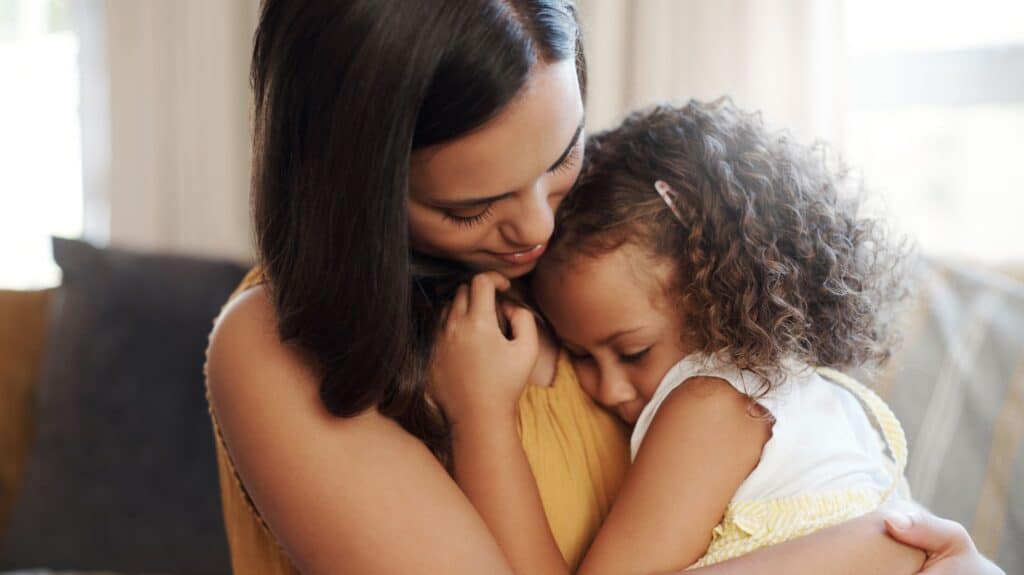4 Things That Can Cause Low Self-Esteem in Children (and How to Avoid Them)
There are four things parents do out of a sense of love for their children that may, in fact, cause low self-esteem. Here’s what they are and how to avoid them.
As parents, we want nothing more than for our children to be happy, healthy, and have a positive self-image.
But sometimes, without realizing it, our actions unintentionally cause more harm than good.
In our effort to help, support, and protect our kids, we either shield them from learning important life lessons or unintentionally communicate messages that work against their confidence and self-esteem.
Children’s self-esteem is highly dependent on how they’ve been taught to respond to the various internal and external factors in their everyday lives. So it’s helpful to be aware of how these factors can impact their self-image.
The following are four things that can cause low self-esteem in children and how you can avoid them:
#1 – Not allowing children to make mistakes
When we see our children struggle to tie their shoes, stumble in a social situation, or fail to manage their time for a homework assignment, we can’t help but want to swoop in to save the day. But when we do, we take away the opportunity for kids to learn from their mistakes and how to overcome challenges.
Mistakes can be life’s most wise teacher. They teach kids – sometimes the hard way – what didn’t work the first time.
Sure, it can be tough to watch your child feel frustrated or upset in these situations, but going through these experiences is important for their growth. By experiencing them, kids become all the more resilient to failure. And when they try again and find that they’re successful, they’ll get a boost of confidence and achievement that will have them beaming with pride.
So what qualifies as a mistake you should allow your child to make?
If your child is doing something that will potentially put them in danger of serious injury then, of course, run to the rescue! But if they get a minor scuff, fail at a task, or forget their homework, it’s better to let them face these challenges independently. These experiences will teach them new skills and give them an opportunity to do better next time.
See related: Learning From Mistakes: Why We Need to Let Children Fail
#2 – Not giving kids enough responsibility
You may think responsibility is the last thing your child wants, but having a sense of duty actually boosts kids’ feelings of self-worth.
Kids who lack responsibility are more likely to feel performance pressure, have behavioral problems, and develop low self-worth.
Giving your child age-appropriate tasks such as cleaning their room, helping with laundry, or even watering the plants will help them feel more capable and accomplished in their day-to-day lives. Not only that, they’ll become a part of a team and feel recognized as an essential part of the family structure, and these skills will stay with them as they develop into adults.
Related: 6 Tips for Teaching Responsibility in Children: a Step by Step Guide
Interested in getting your kids started on chores? My four-lesson course will teach you how to get started, avoid nagging & power struggles, and keep your kids motivated. Click here or the image below to learn more.

#3 – Not letting children process their emotions
A child’s development and sense of self can be deeply affected by how their parents react to their emotions.
Many parents’ natural first instinct, when their child comes to them in distress, is to make all the pain go away. It’s tough to see your child upset, and dealing with a screaming toddler can be an absolute nightmare.
However, a “band-aid solution” isn’t going to be effective in the long run. Your child will eventually revisit the same emotions but have no way of dealing with them on their own. When this happens, your child’s self-esteem can suffer as they’ll lack the emotional intelligence needed to have a strong sense of self.
The next time your child comes to you with negative feelings, teach them how to self-regulate. Help them identify their emotions, understand them, and then give them easy guidelines to follow for when they feel sad, angry, etc., so they’ll have an easier time handling those emotions appropriately in the future.
See related: 10 Emotion-Coaching Phrases to Use When Your Child is Upset and 6 Guaranteed Ways to Boost Your Child’s Emotion Regulation Skills
#4 – Punishing kids for their actions
It’s no secret that your child has and will make poor decisions from time to time — and many of them at that! But this is all a part of learning and growing up. At the end of the day, it doesn’t matter as much what your kids do wrong but that they are coached toward more appropriate behavior.
When kids are punished, they not only don’t understand how to do better in the future, they also are left believing they’re a bad person. The opposite of punishment, positive discipline – where the parent is both kind and firm – not only teaches kids how to behave better but also maintains kids’ sense of self-worth.
Say your daughter hits her sibling for taking away her toy. Making her go to her room would be a punishment for her actions. On the other hand, asking her why she hit her sibling, validating her feelings, having the sibling express how getting hit made them feel, and showing your daughter a better way to express herself would be teaching her to do better in the future.
Essentially, teaching promotes positive relationships and gives children healthy ways to express themselves at a young age. Punishment won’t teach children anything about what they did wrong or how they can do better in the future. Instead, kids’ hold onto those feelings as they are incapable of expressing themselves appropriately, which inevitably will lead to a lack of self-esteem.
See related: How to Discipline Kids While Reaching Their Hearts at the Same Time
Letting go while still being supportive
It goes against our instincts at times to let our children struggle, experience strong emotions, and take on adult responsibilities. Furthermore, making a strong statement through punishment to correct kids’ behavior may feel natural – especially if we were raised that way.
But understanding how kids learn and develop, can help us release those instincts and let our kids experience uncomfortable mistakes and emotions while also taking on responsibility and learning proper behavior. It’s through these experiences that their self-esteem will flourish and grow.
What to do next…
1. Subscribe to Self-Sufficient Kids’ email list.
Like what you read here and want to learn more? Every Thursday I’ll send you one parenting tip about raising self-sufficient kids and creating the peaceful relationship you yearn to have with your child. Click here to sign up.
2. Take one of my quizzes!
Find out if you’re raising a self-sufficient kid (click here) or if you’re doing too much for your kids (click here). At the end of each quiz, you’ll be asked to provide your email address to see the results.
3. Get your kids started on chores.
Learn how to get your child started on chores (& keep them motivated + avoid power struggles) by enrolling in my Get Your Kids Successfully Started on Chores course. Click here to learn more and sign up.

About Kerry Flatley
Hi! I’m Kerry, the mother of two girls and a certified parent educator. I believe it is possible for parents to have a supportive, loving, and warm relationship with their kids while raising them to be independent and ultimately self-sufficient. Over the years, I’ve read numerous books and articles that support this belief and I’ve put these ideas into practice with my own kids. Read more about me and Self-Sufficient Kids here.



